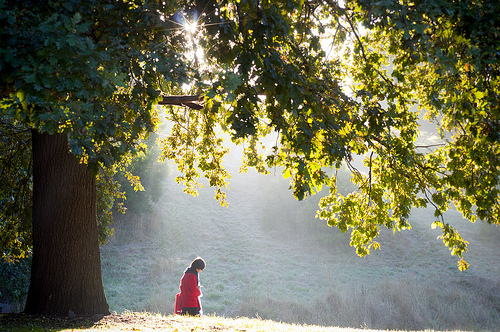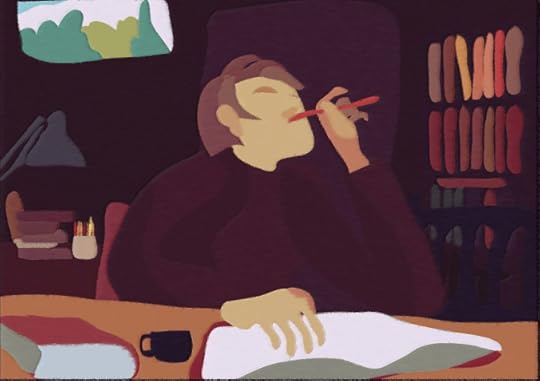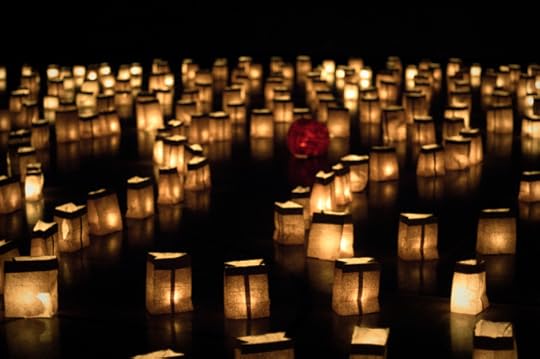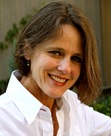Lisa Bennett's Blog, page 2
May 29, 2017
Stay Tuned!
I have been at work on a new project and am not currently posting new content here. Something interesting coming soon!
Filed under: Uncategorized







December 22, 2016
How to Stop Feeling So Bad about Trump & the New Attack on Climate Action
Chris Yakimov
In the moment it became clear that the most powerful office in the world was going to a man who knew and cared little about climate change, I left an election party that suddenly felt more like a wake. My impulse was to be alone, to look at the moon that seemed to glow especially brightly that night, and to think about the people and things I love.
In the month or so that has passed since then, many of us have felt, as the late night comedian Samantha Bee so aptly put it, like Rocky – not when he was triumphantly running up the steps of the Philadelphia Museum of Art, but when he was being brutally knocked about the ring. Every day’s news has seemed both awful and unreal.
To 99 percent of the world’s experts, the consensus is clear: We are at the eleventh hour in the climate crisis. To avoid the most cataclysmic impacts for our children and children’s children, we must take urgent, collective, bold action to reduce carbon emissions from fossil fuels. And, in recent years, we have finally begun doing that. Globally, we have been waking up, coming together, showing ourselves willing to act.
How could America now elect a president who doesn’t get it? Worse, who has since named to his cabinet people who seem deliberately chosen to dismantle the needed climate protections:
For Secretary of the EPA: Oklahoma Attorney General Scott Pruitt who has spent much of his career fighting the EPA.
For Secretary of the Department of Energy: Former Texas Gov. Rick Perry who has said he would demolish it.
For Secretary of the Department of Interior: U.S. Representative Ryan Zinke who has not only questioned the urgency of climate action but whether human behavior contributes to climate change.
And as if to add the greatest insult to injury: For Secretary of State, Rex Tillerson, CEO of Exxon-Mobil, one of the largest contributors to carbon emissions in the world.
Beneath the Sleight of Hand
All of this would be comic, for its obvious power grab by a billionaire who claimed to speak for Americans desperate for decent-paying jobs — if it were not so serious. Yes, the new President-elect is brilliant with sleight-of-hand distractions: Ivanka’s alleged interest in climate change to meeting with Al Gore. But make no mistake: We are witnessing a brazen assault on the science and, more fundamentally, the reality of climate change.
This is happening despite the fact that most nations have committed to take climate action; most Americans want the government to take climate action; and hundreds of leading businesses (outside the fossil fuel industry) recognize climate action as necessary because the alternative comes with too heavy a price tag.
All of this, like the sudden broadside attacks on so many other fronts in our nation, has left me swimming in a turbulent sea of confusion, depression, fear, anger, and hope for a miracle, for a chance to wake from what seems like a very bad dream. In large part, it has felt paralyzing. Almost everyone I know has felt this way.
Beyond the Shock and Confusion
But it’s time for us to emerge from our shock and confusion. It is time, I believe, for the majority of Americans to now face and engage their anger. Not fear. Not hope. Not this time. But anger.
As someone who has spent much of my life in uncomfortable relationship to other people’s anger, I hasten to add: I do not advocate lashing out at the President-elect or his supporters. To feel angry is not to act in ways we abhor. There is, or should be, a pause between feeling angry and acting on the information it gives us.
And that critical pause has shown me that, beyond a shadow of a doubt, the President-elect’s disregard for truth, public opinion, equality, civil society, and the moral imperative of climate action in America is dead wrong and must be resisted.
We must never forget: The majority of Americans did not vote for the President-elect. We are the dominant culture in this country. And, as parents, we must stand up for what is right as we never have before. For the natural world and the 7.4 billion humans who depend upon it, especially children. For racial, ethnic, gender, and economic justice. For Muslims, Mexicans, and good people being targeted by hatred and prejudice. For the America we know and love.
How we do this, as individuals and a society, may not yet be apparent. But it will become so — as long as we don’t disregard the truth of what we feel right now, and of what we truly believe in. Holding our breath, averting our eyes, distracting ourselves through one means or another would only surrender our children’s future, and the future of this planet, to the bullies of the world. And that, especially now, we cannot do.
(This post originally appeared on Moms Clean Air Force.)
Filed under: How Social Change Happens, Parents & Climate Change Tagged: climate action, climate change, donald trump, family, hope, inspiration, motivation, Parenting, politics, trump, untied states politics







October 30, 2016
Vote Clean
Indigo Skies Photography
There have been so many awful moments in this soon-to-be-decided election season that I was surprised recently to recognize that I’d almost lost track of what is actually at stake for our families.
Our children’s future.
It is so simple, so central to a mother’s and father’s beating heart, and yet, in many ways, it has been absent in this campaign season, buried beneath an avalanche of unprecedented demonstrations of lies, ignorance, and hatred.
But it doesn’t have to be this way.
The Republican Presidential candidate has said: “I’m not a big believer in manmade climate change. There could be some impact, but I don’t believe it’s a devastating impact … I would say that it goes up, it goes down, and I think it’s very much like this over the years. We’ll see what happens.”
In other words, the man who would presume to be the next leader of the most powerful nation on Earth thinks the most significant threat to it and the billions of people on it is a matter of belief rather than science. His plan would be to take nothing more than a bystander’s attitude toward combatting and preparing for it.
It took my having children to truly, madly, deeply care about the state of the world and the future we will leave to our children. In the more than a decade since then, I have learned a great deal about the fact that our continued use of oil and coal is wreaking havoc on the brilliance of nature’s systems—and that there are good, cheap, realistic clean energy alternatives.
I have also learned that many powerful people and interest groups oppose the needed transition to a clean energy future for one simple reason: because they benefit from the status quo. They make too much money off the oil and coal that creates manmade climate change.
As parents, we need to stand up for interests more heartfelt than that. We need to walk into the voting book on November 8 with one equally simple but more deeply profound and principled thing in mind: the future well being of our kids.
During the first presidential debate, Hillary Clinton said, “Donald thinks that climate change is a hoax perpetrated by the Chinese. I think it’s real. And I think it’s important that we come to grips with this and deal with it, both at home and abroad.”
That is the voice of a mother and grandmother who, like many others, thinks about the future, cares about the future, and has the good sense to prepare for the future. And that remains the sensibility I want in charge—regardless of the ongoing witch-hunt against this woman, perhaps most disturbingly now reflected in the FBI Director’s unprecedented eleventh-hour interference in this election.
“The best we can do is lean toward the light,” a friend said after we watched the third and final debate together. It was a good reminder of Joseph Campbell’s wise words: In the face of good and evil, light and darkness, the best we can do is lean toward the light.
As I think about the dark side of human nature that has been on display throughout this campaign season, and what could lie ahead if the person who has demonstrated and inspired such hatred is given the power of the presidency, I believe this is what it all comes down to on Election Day:
Stand up for the light, and for the children who are the light of our lives.
Please join me and make the pledge to vote—right now, right here at Clean Air Moms Action.
Lisa Bennett is the co-author of Ecoliterate and a contributor to The Compassionate Instinct, A Place at the Table and other books. She writes frequently about parenting, human nature and climate change. This post was produced with support from Clean Air Moms Action. All opinions are her own.
Filed under: How Social Change Happens, Parents & Climate Change Tagged: Children, climate change, election







The Best Response to a Sordid Election: Your Clean Vote

Indigo Skies Photography
There have been so many awful moments in this soon-to-be-decided election season that I was surprised recently to recognize that I’d almost lost track of what is actually at stake for our families.
Our children’s future.
It is so simple, so central to a mother’s and father’s beating heart, and yet, in many ways, it has been absent in this campaign season, buried beneath an avalanche of unprecedented demonstrations of lies, ignorance, and hatred.
But it doesn’t have to be this way.
The Republican Presidential candidate has said: “I’m not a big believer in manmade climate change. There could be some impact, but I don’t believe it’s a devastating impact … I would say that it goes up, it goes down, and I think it’s very much like this over the years. We’ll see what happens.”
In other words, the man who would presume to be the next leader of the most powerful nation on Earth thinks the most significant threat to it and the billions of people on it is a matter of belief rather than science. His plan would be to take nothing more than a bystander’s attitude toward combatting and preparing for it.
It took my having children to truly, madly, deeply care about the state of the world and the future we will leave to our children. In the more than a decade since then, I have learned a great deal about the fact that our continued use of oil and coal is wreaking havoc on the brilliance of nature’s systems—and that there are good, cheap, realistic clean energy alternatives.
I have also learned that many powerful people and interest groups oppose the needed transition to a clean energy future for one simple reason: because they benefit from the status quo. They make too much money off the oil and coal that creates manmade climate change.
As parents, we need to stand up for interests more heartfelt than that. We need to walk into the voting book on November 8 with one equally simple but more deeply profound and principled thing in mind: the future well being of our kids.
During the first presidential debate, Hillary Clinton said, “Donald thinks that climate change is a hoax perpetrated by the Chinese. I think it’s real. And I think it’s important that we come to grips with this and deal with it, both at home and abroad.”
That is the voice of a mother and grandmother who, like many others, thinks about the future, cares about the future, and has the good sense to prepare for the future. And that remains the sensibility I want in charge—regardless of the ongoing witch-hunt against this woman, perhaps most disturbingly now reflected in the FBI Director’s unprecedented eleventh-hour interference in this election.
“The best we can do is lean toward the light,” a friend said after we watched the third and final debate together. It was a good reminder of Joseph Campbell’s wise words: In the face of good and evil, light and darkness, the best we can do is lean toward the light.
As I think about the dark side of human nature that has been on display throughout this campaign season, and what could lie ahead if the person who has demonstrated and inspired such hatred is given the power of the presidency, I believe this is what it all comes down to on Election Day:
Stand up for the light, and for the children who are the light of our lives.
Please join me and make the pledge to vote—right now, right here.
Lisa Bennett is the co-author of Ecoliterate and a contributor to The Compassionate Instinct, A Place at the Table and other books. She writes frequently about parenting, human nature and climate change. This post was produced with support from Clean Air Moms Action. All opinions are her own.
Filed under: Children/Parenting, Nature/Climate change Tagged: Children, climate change, election







July 2, 2016
Writing the Next Chapter
Some things–divorce in this case–stop us in our tracks. But there are so many more things that can lead us back to life.
There comes a time when we need to give voice to our bare honest truth of the moment–not for the sake of the common motivations: money, fame, security, a sense of meaning or influence, and so on. We must speak or write or paint or sing or travel or climb a mountain or cry out to save our own lives. To resuscitate our spirit or soul. Maybe both. Certainly both. For it is this that helps us find our way forward.
This is the point I am at now. For the past nine months, I have been going through a God-awful divorce. After many years of an unhappy and conflict-ridden marriage, this has not been without its relief. Nor has it come as a surprise. But I have felt–and, in large part still feel–flattened, spent, wrung out all the same.

Frank Starmer/Flickr
I sometimes wonder what my children must think of me now–not for getting divorced but for not writing.
Writing has been one of the greatest sources of meaning and satisfaction in my life. It was what animated me, sparked my thoughts, got me excited, drove me to get up early in the morning and work and work and work. It was, ever since I was a young woman, the way I sought to both expand and deepen my experience of life. To try to make sense of it and see the step ahead.
Now it feels like something I vaguely recall from a distant shore. And yet. And yet. And yet! I can see that shore now. I can almost smell it. I know I am coming, once again, closer to touching it. And as I do, I will get down on my knees and kiss the soil.
For this is what writing can do. Bring us back to life when we’ve been knocked down. Bring us forward to embrace the next chapter. And perhaps above all, bring us together.
I have learned so much over the past nine months of anguish and insight, months and years of having my heart break and expand and grow more supple, more resilient, as a result. I have learned this, most recently, not from my own writing but from others’.
There are simply truths we can find in writing that we are less likely to find in all those day-to-day situations in which we are, or at least, I am so much more likely to drag my ego along with me: to defend, to justify, to fit in, to tell a story that makes me sound more OK than I might feel.
But in writing, whether my own or the hundreds of books that have shaped me, I have come face-to-face with these deeper truths–and they have lit the way along a good path in the darkest of nights. And for this, and for every dear friend who has managed this same brilliant feat through conversation, I am deeply, eternally grateful.
This is my bare honest truth of the moment. May it help me, and you, move forward.
Filed under: Loss/Grief, Love, Relationships, Writing/Creativity Tagged: divorce, relationships, writing







October 7, 2015
Truth-Telling & Platform-Building
JoanMMas via Flickr
If you want to build an audience, publishing experts say, you need to give readers practical information. But if you want to satisfy yourself, you also need to hold onto the reason you write in the first place.
When I finally came around to learning something about the business of platform-building, I soon discovered that there is a mountain of advice out there.
But one point, above all, seemed clear: If you want to attract an audience to your site, you need to offer something people want. Writing advice. Financial advice. Relationship advice. Parenting advice. Leadership advice. Cooking advice.
I’ve never imagined myself qualified to give other people advice—or even particularly interested in it. I just happen to be someone who finds the process of discovery more interesting than how-to tips. But I fell into it all the same.
And the result, for me, was not good.
In grief about the loss of my dear mother, saddened by the demise of a significant relationship, worried about how climate change will affect my children and others’, I started thinking about how to channel what was present for me into something that would be useful to people. And that led to a tagline about how people rise to challenges big and small.
Of course, this was not entirely false. I am fascinated with what loss teaches us; how we grow from facing the reality that things often don’t go our way; and how many seemingly ordinary people do rise in extraordinary ways to the challenges they face in life.
But when I was honest with myself, the truth was I did not feel like a person who should be trying to dole out insights and inspiration to other people.
I am still in grief, I am still sad, I am still afraid, and I am often confused.
Attempting to offer insights to others from this place, even if I was basing it on other people, seemed ridiculous. It also seemed like only half the story: an offering of the light without the dark in life. In a word, it felt fake.
That, I realized, was why I was experiencing writer’s block. Why I was starting and stopping. Going in circles. Feeling unable to push the “publish” button.
And then I realized, or more likely rediscovered, that it was OK to let the idea that I should put things in a pretty box go. The writing I did from those dark but deeply human places of grief, sadness, and fear was actually the writing that most interested me. It seemed most real, most meaningful—and contrary to what I might have expected, not depressing or self-absorbed. It usually went somewhere. It tended to be healing in itself.
So I have decided to let myself out of my self-imposed prison. To give myself permission to write just what is—knowing that this is the plane on which many of us would rather connect anyway.
This is not to say I think writers can disregard the realities of publishing and audience-building in today’s platform-crazy world. But it is to say one must not let it overwhelm the reason one wishes to write in the first place, which for me is the desire to explore, and the hope to connect.
(This post originally appeared on JaneFriedman.com)
Filed under: writing Tagged: creativity, grief, publishing, Writing







Truth-Telling and Platform-Building

JoanMMas via Flickr
When I finally came around to learning something about the business of platform-building, I soon discovered that there is a mountain of advice out there.
But one point, above all, seemed clear: If you want to attract an audience to your site, you need to offer something people want. Writing advice. Financial advice. Relationship advice. Parenting advice. Leadership advice. Cooking advice.
I’ve never imagined myself qualified to give other people advice—or even particularly interested in it. I just happen to be someone who finds the process of discovery more interesting than how-to tips. But I fell into it all the same.
And the result, for me, was not good.
In grief about the loss of my dear mother, saddened by the demise of a significant relationship, worried about how climate change will affect my children and others’, I started thinking about how to channel what was present for me into something that would be useful to people. And that led to a tagline about how people rise to challenges big and small.
Of course, this was not entirely false. I am fascinated with what loss teaches us; how we grow from facing the reality that things often don’t go our way; and how many seemingly ordinary people do rise in extraordinary ways to the challenges they face in life.
But when I was honest with myself, the truth was I did not feel like a person who should be trying to dole out insights and inspiration to other people.
I am still in grief, I am still sad, I am still afraid, and I am often confused.
Attempting to offer insights to others from this place, even if I was basing it on other people, seemed ridiculous. It also seemed like only half the story: an offering of the light without the dark in life. In a word, it felt fake.
That, I realized, was why I was experiencing writer’s block. Why I was starting and stopping. Going in circles. Feeling unable to push the “publish” button.
And then I realized, or more likely rediscovered, that it was OK to let the idea that I should put things in a pretty box go. The writing I did from those dark but deeply human places of grief, sadness, and fear was actually the writing that most interested me. It seemed most real, most meaningful—and contrary to what I might have expected, not depressing or self-absorbed. It usually went somewhere. It tended to be healing in itself.
So I have decided to let myself out of my self-imposed prison. To give myself permission to write just what is—knowing that this is the plane on which many of us would rather connect anyway.
This is not to say I think writers can disregard the realities of publishing and audience-building in today’s platform-crazy world. But it is to say one must not let it overwhelm the reason one wishes to write in the first place, which for me is the desire to explore, and the hope to connect.
(This post originally appeared on JaneFriedman.com)
Filed under: Loss/Grief, Resilience, Well being, Writing/Creativity Tagged: creativity, grief, publishing, writing







September 22, 2015
Is It Useful?
Tavis Ford @Flickr
Do the stories you tell about yourself and others help you navigate life, or get in your way?
Yesterday, not for the first time, I was absorbed with unproductive questions about my life. These tend to be “why” and “what if” questions—about a certain relationship, work project, my relationship to money, and my love of writing.
Why is X the way it is? What if I did Y differently? Would Z really change things?
They are circular, dead-end questions that get me nowhere; and they remind me of something I once heard the Zen teacher John Tarrant say in response to someone who shared a similar semi-scolding inner dialogue:
Is it useful?
If we tell ourselves we are not good at something, when that something is important to us, is it useful? If we tell ourselves others are better than us; we should have done something differently; we need to be other than how we are right now—is that helpful?
Put another way: Are the stories we are telling about ourselves and others in this moment helpful ways to navigate and, more importantly, enjoy life?
It is one of those sword’s edge questions. Ask it—especially about the things you frequently think about—and you’ll immediately know the answer. And most often, in my experience, the answer is no.
Self-doubt is not helpful. Shame is not helpful. Harshness, with oneself or others, is not helpful. Timidity is not helpful. Worry is not helpful. Guilt is not helpful. A closed mind is not helpful. Thinking we know how things will turn out is not helpful.
Inquiry, on the other hand, is helpful. An open mind is helpful. Curiosity is helpful. Love, of course, is helpful. Kindness is helpful. Effort is helpful. And trust in the life journey—especially when we seem to be most in the dark—is helpful.
That’s the one I’m trying, above all, to learn now.
Filed under: Befriending & Resilience Tagged: Buddhism, creativity, happiness, Writing, Zen







The Effect of the Stories We Tell

Tavis Ford @Flickr
Do the stories you tell about yourself and others help you navigate life, or get in your way?
Yesterday, not for the first time, I was absorbed with unproductive questions about my life. These tend to be “why” and “what if” questions—about a certain relationship, work project, my relationship to money, and my love of writing.
Why is X the way it is? What if I did Y differently? Would Z really change things?
They are circular, dead-end questions that get me nowhere; and they remind me of something I once heard the Zen teacher John Tarrant say in response to someone who shared a similar semi-scolding inner dialogue:
Is it useful?
If we tell ourselves we are not good at something, when that something is important to us, is it useful? If we tell ourselves others are better than us; we should have done something differently; we need to be other than how we are right now—is that helpful?
Put another way: Are the stories we are telling about ourselves and others in this moment helpful ways to navigate and, more importantly, enjoy life?
It is one of those sword’s edge questions. Ask it—especially about the things you frequently think about—and you’ll immediately know the answer. And most often, in my experience, the answer is no.
Self-doubt is not helpful. Shame is not helpful. Harshness, with oneself or others, is not helpful. Timidity is not helpful. Worry is not helpful. Guilt is not helpful. A closed mind is not helpful. Thinking we know how things will turn out is not helpful.
Inquiry, on the other hand, is helpful. An open mind is helpful. Curiosity is helpful. Love, of course, is helpful. Kindness is helpful. Effort is helpful. And trust in the life journey—especially when we seem to be most in the dark—is helpful.
That’s the one I’m trying, above all, to learn now.
Filed under: Buddhism/Spirituality, Happiness, Resilience/Well being, Writing/Creativity Tagged: Buddhism, creativity, happiness, writing, Zen







Is This Helpful?

Tavis Ford @Flickr
Yesterday, not for the first time, I was absorbed with unproductive questions about my life. These tend to be “why” and “what if” questions—about a certain relationship, work project, my relationship to money, and my love of writing.
Why is X the way it is? What if I did Y differently? Would Z really change things?
They are circular, dead-end questions that get me nowhere; and they remind me of something I once heard the Zen teacher John Tarrant say in response to someone who shared a similar semi-scolding inner dialogue:
Is it useful?
If we tell ourselves we are not good at something, when that something is important to us, is it useful? If we tell ourselves others are better than us; we should have done something differently; we need to be other than how we are right now—is that helpful?
Put another way: Are the stories we are telling about ourselves and others in this moment helpful ways to navigate and, more importantly, enjoy life?
It is one of those sword’s edge questions. Ask it—especially about the things you frequently think about—and you’ll immediately know the answer. And most often, in my experience, the answer is no.
Self-doubt is not helpful. Shame is not helpful. Harshness, with oneself or others, is not helpful. Timidity is not helpful. Worry is not helpful. Guilt is not helpful. A closed mind is not helpful. Thinking we know how things will turn out is not helpful.
Inquiry, on the other hand, is helpful. An open mind is helpful. Curiosity is helpful. Love, of course, is helpful. Kindness is helpful. Effort is helpful. And trust in the life journey—especially when we seem to be most in the dark—is helpful.
That’s the one I’m trying, above all, to learn now.
Filed under: Happiness, Spirituality, Well being, Writing/Creativity, Zen Tagged: Buddhism, creativity, happiness, writing, Zen










